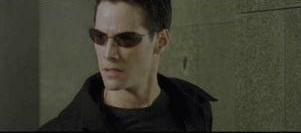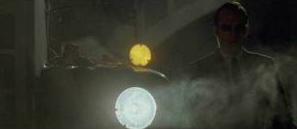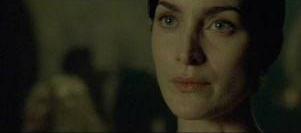Property of Dew's Matrix Fan Page (http://thereisnospoon.moviefever.com)
Warning: These pages may contain movie spoilers. Proceed at your own risk.
The Sixth Sense
Starring: Bruce Willis, Toni Collettte, and Haley Joel Osment.
Director: M. Night Shyamalan
Brief Summary:
Cole Sear (Haley Joel Osment) makes a stunning announcement to child psychologist Dr. Crowe--Cole claims he can see dead people.
Questions/Thoughts To Consider While Watching This Movie:
1. Compare the characters of Neo and Cole in regards to how they come to terms with their unusual gift.
2. Discuss the symbolic nature of Cole's role in the school play, young King Arthur, and the importance of the play's key scene in the movie.
3. Compare the relationship of Malcolm and Cole with the relationship between Neo and the Oracle (or Morpheus).
4. In the book adaption of the movie, M. Night Shyamalan discusses the fact that Malcolm's last name was a symbolic choice. As he puts it, "To me, a crow is sort of a bird of death. Crows give me an ominous feeling of hanging around, so that's what I named him." Discuss this name choice as well as the names given to the characters in "The Matrix." Why do you think that storytellers often give their character's names that have symbolic or multiple meanings?
5. Make a list of all the things you see in the movie, "The Sixth Sense" and "The Matrix" that are red. (It would be a good idea to have a notebook and pen with you while you watch each.) Once you have your list, keep it on hand when thinking about or discussing question 6 and 7.
6. In the book adaption of "The Sixth Sense," the writer and director also talks about his intentional use of the color red. As he puts it, "It's a visual thing in filmaking, the use of color to signify things." Going into further detail, he tells us that, "Anything that was tainted by the other world--the Sixth Sense world--anything that meant more than it actually was, was red."
With these thoughts in mind, compare Shyamalan use of red in "The Sixth Sense" with the use of red in "The Matrix."
7. Explain how Shyamalan and the Wachowski brothers used color in their respective movies, "The Matrix and "The Sixth Sense" to give the viewers "hints" regarding about their big, "mind-blowing" movie plot twists? Why did you think that these hints are important and necessary? (Hint: Look at question 5 and 6 for further information.)
8. Discuss how both movies approach the subject of death.
9. Discuss how both movies approach the subject of accepting your "fate" or "fulfilling your destiny."
10. Compare the major plot twists that can be found in both movies looking at a variety of factors, such as viewer reaction, impact the twists have on the rest of the movie, etc. Do you think that "The Matrix" would have been more successful or effective if the storyline would have be stretched or altered a bit so that its biggest plot twist--Neo waking up and finding out the truth regarding the Matrix World--would have taken place at the end of the movie?
The Game
Starring actors Michael Douglas and Sean Penn. Director: David Fincher
Brief Summary:
Nicholas Van Orton (Michael Douglas) is a successful businessman who receives an unusual birthday gift from his brother--enrollment in a personalized adventure "Game." Upon acceptance of the gift, Orton soon finds his life spinning out of control and he begins to question everything, including the very nature of the Game. Is it really just a game--or could it be real?
Questions/Thoughts To Consider While Watching This Movie:
1. In "The Matrix," Morpheus asks Neo "Do you want to know what it is?" Compare this Morpheus/Neo scene to one from "The Game" when a character asks Nick a very similar question.
2. In "The Game," a character provides Nick a Bible verse. What is the verse and how does it apply to the plot of "The Game" as well as "The Matrix?"
3. Compare and contrast the main characters of Neo ("The Matrix") and Nick ("The Game").
Hint: When thinking about similarities, be sure to discuss the comments that Neo and Nick say to themselves when they find themselves in overwhelming situations (Neo near the window of his boss's office, Nick while underwater in a cab.)
*Also mention the similar situations that Neo and Nick find themselves in. These include: climbing up fire escapes, hiding objects inside books, ending up in run down buildings and alley ways, traveling under bridges in cars, being shot at and chased, getting injured and dirty, having a woman with them that they don't know if they can trust, etc.
4. Analyze the symbolic use of clowns in "The Game." Do you think another object could have used instead? If so, what would would you choose and why? In what context would you use the object?
5. Compare Nick's airport scene in "The Game" with that of Neo's first visit to the Matrix world after being unplugged.
Optional: Incorporate the character Truman (from "The Truman Show") into this discussion as well.
6. Look at the similar color schemes of "The Game" and "The Matrix." Why do you think that white, black, and silver were used predominately in both movies? (Some scenes in "The Game" also have a greenish tint, just like "The Matrix.")
7. Compare and contrast the characters of The Oracle (The Matrix) and Christine (The Game), paying particular attention to their motives and actions. To what degree do you see these two characters either manipulating or helping the main character of their respective movie?
Hint: Be sure to address Christine's drink dumping "accident" and The Oracle's vase breaking "prediction."
8. Both movies have settings that include rundown buildings, homeless people, alleyways, hotels, and piled up garbage. Why do believe that these sets were used in both movies? How do the look of these sets add to the tone or mood of the two movies?
9. Compare and contrast the car/bridge scenes from both movies. Why are these scenes important in regard to the main characters and the overall development of the plots?
10. What do you think was the reasoning behind the fact that many Matrix and Game places are named with the prefix "city?" For example, in the Matrix world there was City Phone, City Garbage, etc while in the Game world there was City Club and City Bank.
11. Explore the issues of personal privacy, paranoia, and conspiracy and look at how they are addressed in "The Matrix" and "The Game." "The Truman Show" could also be included in this discussion.
12. The issue of jumping/falling off of buildings was brought up in "The Game" and "The Matrix" stories. What underlying message(s) or symbolism do you see the movies attaching to this issue?
13. In "The Game," Christine tells Nick to "Wake up. It's a fu**ing con." How does this line also relate to "The Matrix?"
14. As already discussed in one the articles on this site, "The Matrix" contains connections to the book, "The Wonderful Wizard of Oz" plus its movie counterpart. What connection(s) does "The Game" have with it?
15. Discuss the near drowning scenes in both movies and why you believe they were included in both movies.
16. What scene in "The Game" is eerily similar to when Neo wakes up and finds himself trapped in the Matrix pod?
Frequency (2000)
Starring actors: Dennis Quaid, James Caviezel, Andre Braugher. Screenwriter: Toby Emmerich. Director: Gregory Hoblit.
General Summary from Barnes And Noble:
"A freak occurrence in the aurora borealis rewrites the future for John Sullivan (James Caviezel), a policeman still recovering from the death of his father (Dennis Quaid), a heroic fireman, 30 year earlier. Using his father's old ham radio one night, John connects with a strangely familiar man -- eerily, but unmistakably, his father. This fantastic connection inadvertently alters past, present, and future for both of them [....]"
Questions/Thoughts To Consider While Watching This Movie:
1. In Frequency, John Sullivan (the son) is in the position of knowing what is going to happen in the future. Explore the similarities and differences between him and the Oracle.
2. In "The Matrix," Trinity, Morpheus, and Neo all have been given pieces of information regarding the future. Compare their responses and actions to that of Frank Sullivan (the father).
3. In both movies, the question of "Should I mess with history since I know what is already going to happen?" are addressed in some manner. Compare the way in which this question is handled.
4. Was John (the son) "destined" to change the past--or was the solar storm an accident? Was Neo "destined" to be the One--or was it just by luck that he discoved his powers?
5. Compare the cryptic or ambiguous nature of the advice given to Frank about his death with the advice given to Morpheus, Neo, and Trinity by the Oracle. Why wasn't the advice/words of wisdom more direct and detailed?
6. In both movies, there are two time frames--one is in the past and then we have a jump into a point into the future. Compare how the movies attempted to keep these time periods "separate" for the viewers so they wouldn't get confused.
7. Explore the issue of disbelief in both movies, being sure that you analyze the reactions of Neo (The Matrix), Frank Sullivan (Frequency), and Andre Braugher's character in Frequency when they are each faced with a shocking truth.
8. Name at least two aspects of the Frequency plot that were surprising to you. Why do you feel that these plot twists were effective?
What Lies Beneath
Starring Harrison Ford and Michelle Pfeiffer. Directed by Robert Zemeckis.
General Summary:
"The story follows Claire (Michelle Pfeiffer), a housewife and mother whose struggles with supernatural events around her home. Eventually, the occurrences force her and her busy husband (Harrison Ford) to examine their lives.
Questions/Thoughts To Consider While Watching This Movie:
1. After watching the movie think about the movie's title, "What Lies Beneath." In what ways does the title apply to the components of the story? How many subtle and not-so-subtle references to the title can you find in the movie?
2. Compare and contrast the characters Neo and Claire, paying particular attention to their approaches to figuring out "what is going on." How are they impacted by the truths they discover?
3. Would you agree that Claire has "a splinter in her mind" like Neo? Do you see Claire's car accident/memory loss as being a "blue pill" moment?
4. What are some examples of forshadowing in "What Lies Beneath"? Compare the forshadowing techniques in "What Lies Beneath" with those in "The Matrix."
5. How effective were the twists and turns in the movie? Compare "What Lies Beneath"'s major plot twist with that of Neo waking up in the pod.
6. Compare this movie to those by Hitchcock.
7. In your opinion, how satisfying was the movie's conclusion?
8. Water has multiple meanings in "What Lies Beneath" just as it does in "The Matrix." What thing(s) do you see water representing in "What Lies Beneath?"
9. In the movie's documentary, the director said that he purposely placed mirrors throughout the movie. Why do you think he did so? What does a mirror symbolically represent in "What Lies Beneath" as well as "The Matrix"? [Hin: Read about mirrors in the DVD booklet that acompanied the DVD version of this movie.]
10. Can you think of at least one other object (besides water and mirrors) in "What Lies Beneath" that also has deeper/symbolic/duel meaning? [Off the top of my head I can think of two.]
11. Both movies have important scenes that take place in the bathroom. Why do you think that is? What does the bathroom symbolically represent? Name some the similarities that you notice between the bathroom scenes found in both movies.
© Copyright 1999-2001 by Dew, owner of Dew's Matrix Fan Page. No part of this text may be written, copied or reproduced without express written consent.


